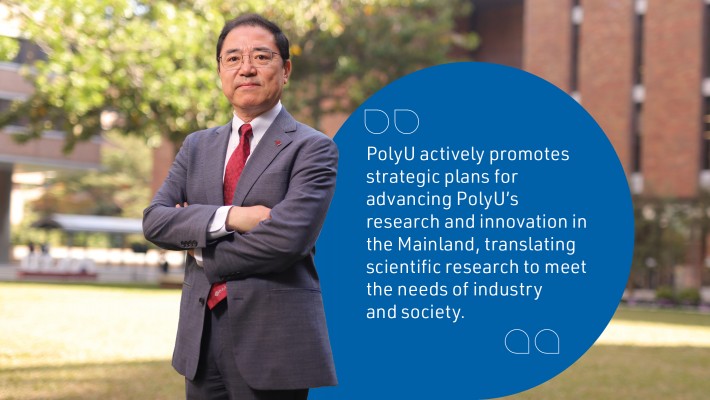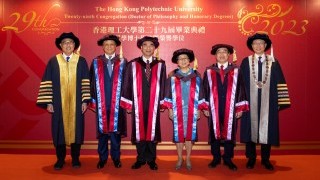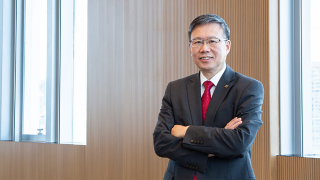Driving impactful research and innovation in the Mainland - a conversation with Associate Vice President (Mainland Research Advancement) Professor DONG Cheng
A distinguished biomedical engineer, Professor DONG Cheng was appointed Associate Vice President (Mainland Research Advancement) at PolyU in 2023. He also serves as Chair Professor of Cell Engineering and ImmunoMedicine and Director of The Hong Kong Polytechnic University Shenzhen Research Institute. Prior to PolyU, he had a prolific career in the US and received prestigious awards including the Faculty Career Award from the US National Science Foundation.
You have been working overseas for more than 30 years. What drove you to join PolyU as the Associate Vice President (Mainland Research Advancement) and Director of The Hong Kong Polytechnic University Shenzhen Research Institute (SZRI)?
Indeed, it was a big decision for me when I considered moving from the US to Hong Kong, especially after spending more than three decades of my academic career in an American institution as a professor and an academic administrator. What really attracted me to join PolyU was the University’s reputation and its significant emphasis on research innovation and translation.
In my capacity as the Associate Vice President for Mainland Research Advancement, I will lead PolyU in large-scale research advancement across Mainland China, promoting research translation and enterprise where it is most needed.
Furthermore, my position as the Director of SZRI provides me with another important opportunity to make PolyU’s research more impactful. I am eager to shape SZRI into a more “theme-based multiinvestigators interdisciplinary platform”, so that PolyU’s translational research will meet the most critical needs in Shenzhen, as well as the Greater Bay Area (GBA), now and in the near future.
Could you share your insights into the University’s future strategies for advancing its research impact in the Mainland?
If we focus solely on the Hong Kong market, we will miss an opportunity to advance our research enterprise goals. It is critically important for us to learn the Mainland’s needs from local governments, industries, and higher education institutions in technology innovation, talent cultivation and economic growth. We must focus our strategies for PolyU on effective research innovations and translations into impactful applications in the Mainland.
Currently, PolyU is building multiple Technology and Innovation Research Institutes in Mainland cities, including Jinjiang, Wuxi, Hangzhou, and Wenzhou, amongst others, where we could accomplish such goals. All these reflect our strategic plans for advancing PolyU’s research and innovation in Mainland China.
At the same time, a strategic shift of SZRI into a more “theme-based multi-investigators interdisciplinary platform” will foster greater impact for research innovation and translation that meet the needs of the GBA. Detailed areas of platform development are currently under discussion, involving both the PolyU leadership and the Shenzhen local government. Plans are slated to be launched at the beginning of 2024.
From your perspective, what are the strengths and opportunities of PolyU in advancing its research impact in the Mainland?
PolyU possesses applied research strengths. We also have eleven research institutes and six research centres (under the PolyU Academy for Interdisciplinary Research) to facilitate interdisciplinary collaboration for impactful research to address key societal challenges. We shall fully advance these strengths and translate our research innovations into applications. A crucial word for how and where PolyU can fulfill our mission is ‘opportunities’. The strategies we have in place for advancing our Mainland research impact and translation I mentioned earlier will take PolyU to the next level of success.
As the Chair Professor of Cell Engineering and ImmunoMedicine, could you share some of your recent research focuses with us?
My research area lies in biomedical engineering, specifically in cellular and immune-engineering, focusing on immune cell-mediated drug delivery and immunotherapies. As part of the developments of the new SZRI platform, I aim to build and focus on three key new areas for my research: Stem Cells and Immune Engineering, Cell Manufacturing, and Immune Cell Therapy. Research in these areas will have an impact on clinical applications, immunotherapy, personalised medicine and industrial technology innovation.
Could you share your views about the future development of biomedical engineering? And in what ways PolyU could elevate its biomedical engineering research to the next level?
Biomedical Engineering (BME) is one of the fastest growing disciplines within the fields of engineering and science. Its applicability in the medical field makes it a truly interdisciplinary profession. In terms of BME at PolyU, we prepare our students to become future leaders in medical professions, healthcare industries, biomedical research, and academia.
PolyU’s current strategies in building various Technology and Innovation Research Institutes in the Mainland offer great opportunities for biomedical innovation to meet societal and industrial needs, and hence are a perfect platform for BME research translation and success.
What advice would you give to young people who aspire to be successful researchers in Mainland China, especially in the Greater Bay Area region?
Keep your eyes open, keep your mind open, and pursue interdisciplinary fields. It is not a matter of which specific major you choose; it is a matter of where your passion lies. PolyU is now charting a new path and is building new connections in the Mainland, especially in the GBA, where there are plenty of opportunities to apply and translate knowledge into something that can really benefit mankind. So, come join PolyU!
Do you have a motto that you live by?
There is no limit to what we can achieve: the sky is not the limit.
What are your hobbies? How do you spend your leisure time?
Walking, hiking, biking, and photography. I enjoy nature, as well as good food.






